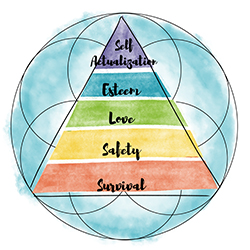Safety
HEALTH, FITNESS, FEARS, AND FINANCIAL SECURITY
Safety is about more than just feeling protected—it’s about building a foundation that supports your peace of mind. When you feel secure in your body, health, finances, and environment, it becomes easier to grow, rest, and thrive.
Core-concepts
Tier 2
Once physiological needs are met, individuals seek safety and security, both physically and emotionally. Safety needs encompass:
- Personal Security: Protection from harm, danger, and threats.
- Financial Security: Assurance of resources and financial stability.
- Health and Well-being: Access to healthcare and a sense of physical safety.
- Stability: A stable and predictable environment.
Creating safety may require shifting out of comfort zones. It takes mental and physical agility to adapt, explore new routines, and build a life where you feel supported. This tier invites you to develop sustainable habits that give you long-term peace and confidence—while also revisiting your foundational needs whenever life calls for a reset.
Safety Needs
 Questions
Questions
- Do I feel safe in my body, relationships and financial situation?
- What daily routines support my long-term sense of security?
- Are there any threats or sources of anxiety that I need to address?
- What is one step I can take today to build a safer, more stable foundation?
Write the ways you practice and fulfill your safety needs.
Login to view.

Resources
Health & Well-being
Our health serves as a foundation for safety. Having our health alleviates many concerns/fears, and is essential for a fulfilling life. Health is directly influenced from having routines that serve us well in the first tier of survival.
Our immune system possesses the ability to combat illnesses when adequately fortified with nutrient rich food. In times when our immune system is compromised or when we've overindulged, herbal remedies can serve as a valuable secondary defense.
Exploring a spectrum of healthcare options, including Western medicine, Eastern medicine, and holistic approaches, provides a balanced approach to healing and maintaining health.
 Action
Action
- Revisit your survival tier routines-food, sleep, hydration, and detox.
- Explore holistic options: combine Western, Eastern and natural remedies.
- Use herbs and natural remedies for minor imbalances.
- Prevent burnout with regular self-care and scheduled rest.
-
Explore the Pure Food Course.
Fitness
Physical fitness enhances the comfort and quality of our lives. Strength, flexibility, endurance, and balance gained through fitness make everyday tasks easier. Fitness contributes positively to nearly every aspect of our lives.
Setting fitness goals not only contributes to your safety but also boosts your confidence within the esteem tier. As you gain strength and confidence, you'll likely find fitness more enjoyable.
To enhance your fitness, virtually any workout routine you choose can be effective if you commit to putting in the effort consistently. However, it's crucial to maintain balance by strengthening and stretching all areas of your body with proper form to ensure proper alignment.
 Action
Action
-
Explore Activities: Seek out a fitness activity that you genuinely enjoy and find motivating. Try The Flexibility Challenge to increase flexible strength.
-
Find Motivation: Identify individuals or role models who inspire you in your fitness journey.
-
Community Engagement: Participate in group activities that foster a sense of community, which aligns with the Love tier in Maslow's Hierarchy.
-
Action Plan: Create and schedule fitness routines that suit your goals and preferences.
-
Balance Approach: Ensure that your fitness routine encompasses a well-rounded balance of strength training, flexibility exercises, cardiovascular endurance, and exercises for balance and coordination.
 Read
Read
Understand how fitness can be integrated into various aspects of life, depending on your specific goals, values, and priorities.
Freedom From Fears
One of life's most significant challenges is confronting our fears and acknowledging the darkness within us.
The most effective approach to facing our fears is to fully understand them, to immerse ourselves in the depths of our apprehensions, and to explore every corner of them.
For instance, if you grapple with financial fears, the most constructive action is to educate yourself extensively on financial matters, and to fearlessly delve into the subjects that evoke anxiety. Often, fear is rooted in the unknown.
 Read
Read
 Question
Question
- What do I fear?
- Why do I fear __________?
- Do I know every aspect of the thing I fear?
- How do I choose to face my fears?
 Action
Action
-
Identify Your Fears: Start by recognizing and acknowledging your specific fears related to safety and security. It could include concerns about financial stability, personal safety, health, or shelter.
-
Education and Knowledge: The more you understand the sources of your fears, the better equipped you'll be to address them. Invest time in learning about topics such as personal finance, health, and safety measures.
-
Emergency Preparedness: Develop plans and strategies to address safety concerns. This might include creating an emergency fund, having insurance, and knowing how to respond in case of various emergencies.
-
Seek Professional Help: If your fears are particularly debilitating or complex, consider consulting a therapist or counselor. They can provide guidance and strategies for managing anxiety and fear.
-
Positive Visualization: Practice positive visualization techniques to reframe your thoughts and feelings about safety. Visualize yourself in secure and protected situations.
-
Incremental Exposure: Gradually expose yourself to situations that trigger your fears but in a controlled and safe manner. This can help desensitize your anxiety over time.
-
Build a Support System: Connect with friends, family, or support groups who can provide emotional support and share strategies for overcoming similar fears.
-
Mindfulness and Meditation: Mindfulness practices and meditation can help you manage anxiety and fear by promoting a sense of calm and self-awareness.
-
Set Realistic Goals: Break down your larger safety-related goals into smaller, manageable steps. Achieving these smaller milestones can boost your confidence in your ability to overcome fears.
-
Track Progress: Keep a journal to record your progress, including your successes and challenges. This can help you stay motivated and track improvements over time.
Financial Security
Money is a practical means to achieve greater freedom and pursue our desired activities. While it's true that many aspects of life can be enjoyed without excessive wealth, money can provide access to better resources, tools, supplies, and assistance, enabling us to make a more meaningful contribution to society.
However, it's important to recognize that to receive value, we must contribute value to the world. Even if we don't believe in the law of attraction, it's crucial to provide something valuable to attract value in return.
Money expands our choices, but an abundance of choices can lead to decision-making challenges. The key is to align our financial decisions with our overarching goals, values, and priorities. If you've laid a strong foundation, you should have a solid understanding of how to generate more abundance for yourself and your family.
 Action
Action
-
Evaluate Spending: Review your spending habits and assess if they align with your values and long-term goals.
-
Sustainable Spending: Seek ways to spend money wisely and sustainably.
-
Work Efficiency: Analyze your work efficiency and explore methods, tools, or practices to boost productivity.
-
Provide Value: Reflect on how you can enhance your value in work or personal endeavors through continuous improvement and learning.
-
Skill Enhancement: Identify the skills or knowledge necessary to elevate your value in your chosen field or industry.
-
Negotiate Compensation: Assess whether you merit higher compensation for your contributions and learn negotiation techniques to secure fair rewards.
-
Work Environment: Consider your preference between working from home or a traditional office, aligning with your goals and comfort.
-
Employment vs. Entrepreneurship: Reflect on your sense of security and comfort as an employee versus an entrepreneur, acknowledging the advantages and challenges of both paths.
These considerations can guide you in achieving financial security and making choices that resonate with your values, priorities, and aspirations.
 Question
Question
- Where do I spend my money?
- How can I spend my money more wisely and sustainably?
- How can I work more efficiently?
- How can I provide higher value?
- What do I need to learn to be of higher value?
- Do I deserve higher pay, and how do I negotiate it?
- Would I be more comfortable working from home?
- Would I feel more secure or comfortable as an employee or as an entrepreneur?
 Read
Read
- I Will Teach You To Be Rich by Ramit Sethi
- Rich Dad Poor Dad by Robert T. Kiyosaki
- Think and Grow Rich by Napoleon Hill
- MONEY Master the Game: 7 Simple Steps to Financial Freedom by Tony Robbins





 Questions
Questions Action
Action